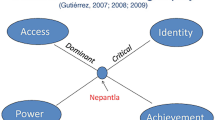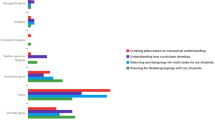Abstract
Research repeatedly documents that teachers are underprepared to teach mathematics effectively in diverse classrooms. A critical aspect of learning to be an effective mathematics teacher for diverse learners is developing knowledge, dispositions, and practices that support building on children’s mathematical thinking, as well as their cultural, linguistic, and community-based knowledge. This article presents a conjectured learning trajectory for prospective teachers’ (PSTs’) development related to integrating children’s multiple mathematical knowledge bases (i.e., the understandings and experiences that have the potential to shape and support children’s mathematics learning—including children’s mathematical thinking, and children’s cultural, home, and community-based knowledge), in mathematics instruction. Data were collected from 200 PSTs enrolled in mathematics methods courses at six United States universities. Data sources included beginning and end-of-semester surveys, interviews, and PSTs’ written work. Our conjectured learning trajectory can serve as a tool for mathematics teacher educators and researchers as they focus on PSTs’ development of equitable mathematics instruction.



Similar content being viewed by others
Notes
Since many PSTs had not considered children’s multiple mathematical knowledge bases before taking methods courses, our data are dominated by examples of the initial phases of our conjectured learning trajectory. This has resulted in a more refined understanding of these two phases. Further refinement of the third phase will require studying teachers over time.
References
Aguirre, J. (2009). Privileging mathematics and equity in teacher education: Framework, counter-resistance strategies and reflections from a Latina mathematics educator. In B. Greer, S. Mukhopadhyay, S. Nelson-Barber, & A. Powell (Eds.), Culturally responsive mathematics education (pp. 295–319). New York: Routledge.
Bartell, T. G., Foote, M. Q., Aguirre, J. M., Roth McDuffie, A., Drake, C., & Turner, E. E. (2010). Preparing preK-8 teachers to connect children’s mathematical thinking and community based funds of knowledge. In P. Brosnan, D. B. Erchick, & L. Flevares (Eds.), Proceedings of the 32nd annual meeting of the North American chapter of the international group for the psychology of mathematics education (pp. 1183–1191). Columbus, OH: The Ohio State University.
Battey, D., & Chan, A. (2010). Building community and relationships that support critical conversations on race: The case of cognitively guided instruction. In M. Q. Foote (Ed.), Mathematics teaching and learning in K-12: Equity and professional development. New York: Palgrave Macmillan.
Bogdan, R., & Biklen, S. (1992). Qualitative research for education: An introduction to theory and methods. Boston: Allyn and Bacon.
Carpenter, T. P., Fennema, E., Peterson, E., Chiang, C. P., & Loef, M. (1989). Using knowledge of children’s mathematics thinking in classroom teaching: An experimental study. American Educational Research Journal, 26, 499–531.
Civil, M. (2007). Building on community knowledge: An avenue to equity in mathematics education. In N. Nasir & P. Cobb (Eds.), Improving access to mathematics: Diversity and equity in the classroom (pp. 105–117). New York: Teachers College Press.
Clements, D. H., & Sarama, J. (2004). Learning trajectories in mathematics education. Mathematical Thinking and Learning, 6(2), 81–89.
Cochran-Smith, M., & Lytle, S. (1999). Relationships of knowledge and practice: Teacher learning in communities. Review of Research in Education, 24(1), 249–305.
Feiman-Nemser, S. (2001). From preparation to practice: Designing a continuum to strengthen and sustain teaching. Teachers College Record, 103(6), 1013–1055.
Fennema, E., Carpenter, T. P., Franke, M. L., Levi, L., Jacobs, V. A., & Empson, S. B. (1996). A longitudinal study of learning to use children’s thinking in mathematics instruction. Journal for Research in Mathematics Education, 27(4), 403–434.
Foote, M. Q. (2009). Stepping out of the classroom: Building teacher knowledge for developing classroom practice. Teacher Education Quarterly, 36(3), 39–53.
Gay, G. (2009). Preparing culturally responsive mathematics teachers. In B. Greer, S. Mukhopadhyay, A. B. Powell, & S. Nelson-Barber (Eds.), Culturally responsive mathematics education (pp. 189–205). New York: Routledge.
Gonzalez, N., Moll, L., & Amanti, C. (2005). Funds of knowledge: Theorizing practices in households and classrooms. Mahwah, NJ: Lawrence Erlbaum.
González, N., Andrade, R., Civil, M., & Moll, L. (2001). Bridging funds of distributed knowledge: Creating zones of practices in mathematics. Journal of Education for Students Placed at Risk, 6(1–2), 115–132.
Grossman, P., McDonald, M., Hammerness, K., & Ronfeldt, M. (2008). Dismantling dichotomies in teacher education. In M. Cochran-Smith, S. Feiman-Nemser, D. J. McIntyre, & K. E. Demers (Eds.), Handbook of research on teacher education: Enduring questions in changing contexts. New York: Routledge.
Hollins, E., & Guzman, M. (2005). Research on preparing teachers for diverse populations. In M. Cochran-Smith & K. Zeichner (Eds.), Studying teacher education (pp. 477–548). Mahwah, NJ: Lawrence Erlbaum.
Howard, G. R. (1999). We can’t teach what we don’t know: White teachers, multiracial schools. New York: Teachers College Press.
Jacobs, V. C., Lamb, L., & Philipp, R. (2010). Professional noticing of children’s mathematical thinking. Journal for Research in Mathematics Education, 41(2), 169–202.
Khisty, L. (1997). Making mathematics accessible to Latino students: Rethinking instructional practice. In J. Trentacosta & M. Kenney (Eds.), Multicultural and gender equity in the mathematics classroom: The gift of diversity, 1997 yearbook of the national council of teachers of mathematics (pp. 92–101). Reston, VA: NCTM.
Kitchen, R. (2005). Making equity and multiculturalism explicit to transform mathematics education. In A. Rodriguez & R. S. Kitchen (Eds.), Preparing mathematics and science teachers for diverse classrooms: Promising strategies for transformative pedagogy (pp. 33–60). Mahwah, NJ: Lawrence Erlbaum.
Ladson-Billings, G. (1994). The dreamkeepers: Successful teachers of African American children. San Francisco: Jossey-Bass.
Leonard, J. (2008). Culturally specific pedagogy in the mathematics classroom: Strategies for teachers and students. New York: Routledge.
Lerman, S. (2001). A review of research perspectives on mathematics teacher education. In F. L. Lin & T. J. Cooney (Eds.), Making sense of mathematics teacher education (pp. 33–52). Dordrecht, Netherlands: Kluwer.
Mason, J. (2008). Being mathematical with and in front of learners: Attention, awareness, and attitude as sources of difference between teacher educators, teachers and learners. In B. Jaworski (Vol. Ed.) & T. Wood (Series Ed.), Handbook of mathematics teacher education (Vol. 4): The mathematics teacher educator as a developing professional (pp. 31–56). Rotterdam, Netherlands: Sense.
McLaughlin, D., & Calabrese Barton, A. (2011). Elementary seniors noticing, analyzing and responding to students’ cultural knowledge and experience in learning to teach science as practice for all. Paper presented at the annual meeting of the national association for research in science teaching, Orlando, FL.
Miles, M. B., & Huberman, A. M. (1994). Qualitative data analysis: An expanded sourcebook (2nd ed.). Thousand Oaks, CA: Sage.
Moschkovich, J. (1999). Supporting the participation of English language learners in mathematical discussions. For the Learning of Mathematics, 19(1), 11–19.
Philipp, R., Ambrose, R., Lamb, L., Sowder, J., Schappelle, B., Sowder, L., et al. (2007). Effects of early field experiences on the mathematical content knowledge and beliefs of prospective elementary school teachers: An experimental study. Journal for Research in Mathematics Education, 38(5), 438–476.
Putnam, R. T., & Borko, H. (2000). What do new views of knowledge and thinking have to say about research on teacher learning? Educational Researcher, 29(1), 4–15.
Rodriguez, A., & Kitchen, R. (2005). Preparing mathematics and science teachers for diverse classrooms: Promising strategies for transformative pedagogies. Mahwah, NJ: Lawrence Erlbaum.
Sherin, M., Jacobs, V., & Philipp, R. (2010). Mathematics teacher noticing: Seeing through teachers’ eyes. New York: Routledge.
Simon, M. (1995). Reconstructing mathematics pedagogy from a constructivist perspective. Journal for Research in Mathematics Education, 26, 114–145.
Sleeter, C. E. (2001). Preparing teachers for culturally diverse schools: The overwhelming presence of whiteness. Journal of Teacher Education, 52(2), 94–106.
Stevens, S. Y., Shin, N., & Krajcik, J. S. (2009). Towards a model for the development of an empirically tested learning progression. Presentation at the learning progressions in science (LeaPS) conference, Iowa City, IA.
Vacc, N., & Bright, G. (1999). Elementary preservice teachers’ changing beliefs and instructional use of children’s mathematical thinking. Journal for Research in Mathematics Education, 30(1), 89–110.
Villegas, A. M., & Lucas, T. (2002). Educating culturally responsive teachers: A coherent approach. Albany, NY: SUNY Press.
Wenger, E. (1998). Communities of practice: Learning, meaning and identity. Cambridge: Cambridge University Press.
WGBH Educational Foundation (Producer). (1997). Teaching math: A video library, K-4. [DVD]. Available from: http://www.learner.org.
Wiggins, R. A., & Follo, E. J. (1999). Development of knowledge, attitudes, and commitment to teach diverse student populations. Journal of Teacher Education, 50(2), 94–105.
Acknowledgments
This material is based upon work supported by the National Science Foundation under Grants No. 1020155 and No. 0736964. Any opinions, findings, and conclusions or recommendations expressed in this material are those of the author(s) and do not necessarily reflect the views of the National Science Foundation.
Author information
Authors and Affiliations
Corresponding author
Rights and permissions
About this article
Cite this article
Turner, E.E., Drake, C., McDuffie, A.R. et al. Promoting equity in mathematics teacher preparation: a framework for advancing teacher learning of children’s multiple mathematics knowledge bases. J Math Teacher Educ 15, 67–82 (2012). https://doi.org/10.1007/s10857-011-9196-6
Published:
Issue Date:
DOI: https://doi.org/10.1007/s10857-011-9196-6




